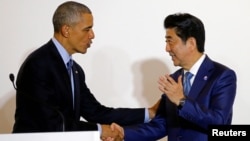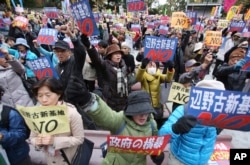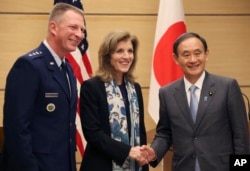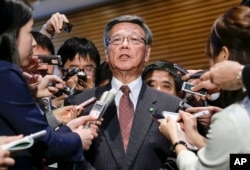Japanese Prime Minister Shinzo Abe told President Barack Obama of his country's "profound resentment" over a former U.S. Marine's confessed involvement in the killing of a 20-year-old Japanese woman outside an American military base in Okinawa.
"I'm just speechless," Abe said at a news conference after discussing the slaying with Obama in a face-to-face meeting before the G-7 summit of the world's wealthiest countries in Ise Shima. "The entire Japan is deeply shocked by this latest incident."
Obama said he expressed "our sincerest condolences and deepest regrets over the Okinawa incident. The United States is appalled by any violent crime that may have occurred or been carried out by any U.S. personnel or U.S. contractors. We consider it inexcusable."
The two leaders discussed the incident just days after Japanese authorities arrested Kenneth Franklin Shinzato, a 32-year-old former U.S. Marine, who they said confessed to stabbing and strangling the woman, Rina Shimabukuro, and then dumping her body in a wooded area near the American base where he worked.
Obama said the U.S. will continue to cooperate in the investigation of the killing "to ensure justice is done under the Japanese legal system. We want to see this crime prosecuted," just as if it occurred in the United States.
Discussion of the killing was hurriedly tacked on to the Obama-Abe discussions that also touched on slow economic growth throughout the world's major economies and Obama's visit Friday to Hiroshima, the Japanese city where the United States dropped an atomic bomb in 1945, killing tens of thousands of Japanese and hastening the end of World War II.
The young woman’s death has brought back memories of the 1995 rape of Japanese schoolgirls by U.S. military personnel on Okinawa, which triggered huge demonstrations there against the American bases.
The latest crime could become a further impediment to Abe’s push to relocate a U.S. Marine Corps air station to another part of Okinawa’s main island, a move that already has been facing significant local opposition.
The Abe-Obama meeting is seen as unlikely to soothe the feelings of many Okinawans.
“My sense is that they’re just doing it for show as a reaction to calm down the situation in Okinawa,” said Masaaki Gabe, professor of international relations at the University of the Ryukyus.
“If Obama meets the people of Okinawa it’ll have more impact for the Okinawans,” similar to the U.S. president’s planned meeting Thursday with atomic bomb victims in Hiroshima, Gabe told VOA.
“I don’t expect anything” to come out of the Abe-Obama exchange about Okinawa," said Gabe.
Okinawa’s governor, Takeshi Onaga, was rebuffed by the central government after he requested to meet this week with the U.S. president.
“We think that issues related to security and diplomacy should be discussed between the central governments of countries involved,” said chief cabinet secretary Yoshihide Suga in Tokyo.
Kennedy visit
U.S. Ambassador Caroline Kennedy is planning to visit Okinawa for talks with Governor Onaga, according to Japanese government officials quoted by local media.
The governor, who repeatedly has stated that Okinawa is unfairly burdened with the bulk of U.S. military installations in the country, is calling for a “drastic review” of the Status of Forces Agreement (SOFA) that governs the presence of American military personnel in Japan.
“The issues or the concerns that the government of Japan has with the SOFA can be addressed in implementation of the SOFA, rather than a wholesale revision,” Pentagon spokesman Jeff Davis said on Monday. “We’ll continue to do that going forward.”
U.S. Defense Secretary Ash Carter has called his counterpart in Tokyo, Defense Minister Gen Nakatani, to convey “his sadness and his regret,” about the killing of the Japanese woman, according to a Pentagon statement.
Nakatani, according to Japanese media, replied "the occurrence of an extremely brutal and atrocious incident through a despicable act is abominable and extremely regrettable."
Nakatani reportedly told Carter that efforts should be made to prevent a recurrence and to heighten discipline of Americans in uniform and the civilian workers on U.S. bases in Japan.
There are 53,000 U.S. military personnel based in Japan, plus 43,000 family dependents, and 5,000 Department of Defense civilian employees. Fifteen of the 23 American bases in Japan are located in Okinawa, which was occupied by the United States from the time of Japan’s World War Two defeat in 1945 until 1972.
The Okinawa bases encompass about 10 percent of the total land of the southern prefecture, which is a chain of semi-tropical islands.








